 Emergency care | Inequalities | Primary, community and social care services
Emergency care | Inequalities | Primary, community and social care services
Learning about what works in urgent community response
The initial report from the national urgent community response (UCR) evaluation, along with an economic modelling tool to help service providers and systems understand the impact of UCR, is now available.
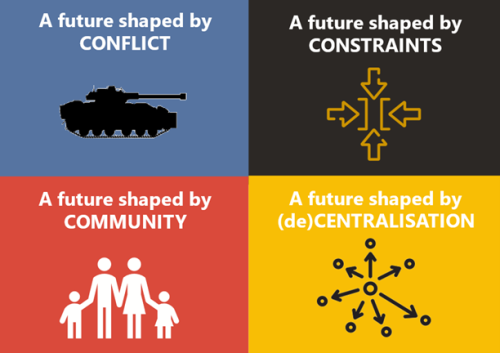 Primary, community and social care services
Primary, community and social care services
Exploring the Edge of Tomorrow, Today
Exploring the critical building blocks for a resilient social care system in 2035 with the West Midlands Association of Directors of Adult Social Services (WM-ADASS).
 Evaluation and impact assessment | Futures thinking | Learning and development | Strategy development
Evaluation and impact assessment | Futures thinking | Learning and development | Strategy development
Evaluating and embedding social values in procurement at East London NHS Foundation Trust
This report presents emerging findings from the early development stages of a social value approach to procurement by East London NHS Foundation Trust (ELFT). These findings provide insights for other organisations beginning to explore how to use procurement to contribute to improving health and…
 Inequalities | Policy | Primary, community and social care services
Inequalities | Policy | Primary, community and social care services
Evaluation of Building the Right Support: Final Reports
Building the Right Support was a national plan to provide better support to people with a learning disability or autism.
 Mental health | Policy
Mental health | Policy
Estimating the impact of the proposed reforms to the Mental Health Act on the workload of psychiatrists
In January 2021, the Government published a White Paper, setting out its plans to reform the Mental Health Act. The Government invited views on the paper and in July 2021, it published a summary of the consultation responses and its plans to address the issues raised. The proposed reforms aim to…
 Mental health | Primary, community and social care services
Mental health | Primary, community and social care services
Inequities in children and young people’s mental health services
Good mental health during early years and childhood has a great bearing on health throughout life. By contrast, poor mental health can cast a long shadow. Consequences may include depression, self-harm, and poor physical health. Services recognise this. They aim to provide access to support in a…
 Better use of analysis | Elective care | Emergency care | Inequalities | Primary, community and social care services | Public health and prevention
Better use of analysis | Elective care | Emergency care | Inequalities | Primary, community and social care services | Public health and prevention
Less noise and more light: using criteria-driven analysis to tackle inequalities
Reducing health inequality is a long-standing aim of health policy. Yet the gap between policy aim and population outcome has grown in recent years: on most measures health inequalities have got worse.
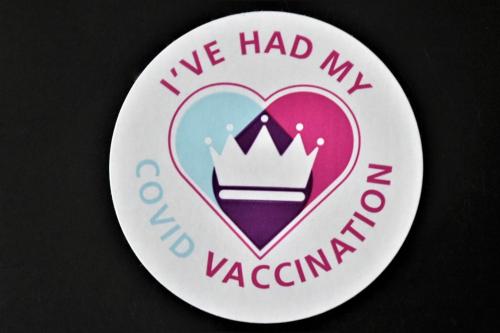 Policy | Primary, community and social care services | Public health and prevention
Policy | Primary, community and social care services | Public health and prevention
Increasing vaccine uptake
The purpose of this work was to identify the key features of local initiatives which encourage vaccine uptake in different population groups, and share these for others to learn from.
 Elective care | Inequalities | Policy | Primary, community and social care services
Elective care | Inequalities | Policy | Primary, community and social care services
Socio-economic inequalities in access to planned hospital care: causes and consequences
Tacking inequalities in health is a long-standing NHS policy objective. Variation in the experiences and outcomes of different communities during the COVID-19 pandemic served to bring this issue back into focus.
 Inequalities | Policy | Primary, community and social care services | Public health and prevention
Inequalities | Policy | Primary, community and social care services | Public health and prevention
Reviewing the evidence on digital inclusion
Digital technology is a significant part of our daily lives. It has changed the way we interact with each other, the services we use, and the ways we work. The NHS is no exception. Digital technology has begun to change the way health…
 Elective care | Policy | Primary, community and social care services | Public health and prevention
Elective care | Policy | Primary, community and social care services | Public health and prevention
Evidence review: Early diagnosis of cancer
Detecting cancers early is essential to saving lives and reducing the need for invasive treatments. So, in 2019, the NHS Long Term Plan set a national target for increasing the proportion of cancers diagnosed at an early stage. There is room for improvement in current performance. In 2018, 55% of…
 Inequalities | Mental health | Policy | Primary, community and social care services | Public health and prevention
Inequalities | Mental health | Policy | Primary, community and social care services | Public health and prevention
Learning from lockdown: support for people experiencing homelessness
There are few clearer measures of societal health than homelessness. On this count, and despite its enormous material wealth, England is in poor shape. Relative to the recent past, and any country we might want to compare ourselves to, we have a problem with homelessness. The causes of homelessness…
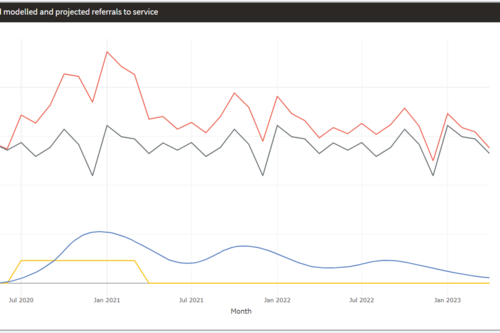 Better use of analysis | Inequalities | Mental health
Better use of analysis | Inequalities | Mental health
Mental Health Surge Model
Early in the Covid pandemic, it became clear that people’s mental health would suffer. Whether through bereavement, unemployment, social isolation, not being able to access support services – or a host of other routes – an alarming picture began to emerge and attract attention.
 Inequalities | Mental health
Inequalities | Mental health
Accessibility of perinatal mental health services for women from Ethnic Minority groups
Barriers to accessing mental health care during pregnancy and the first postnatal year (perinatal period) seem to be greater for ethnic minority women.
Modelling the impact of covid on waiting lists for planned care
Working with the national collaboration to coordinate covid-related analysis, and the NHSE/I Midlands region, the Strategy Unit has produced a ‘systems dynamics’ model of waiting lists for planned care. The model is freely available for non-commercial use across the NHS. Here, Steven Wyatt and Mike…
Primary and Community Qualitative Insights
The COVID-19 response required rapid change and innovation across health and care. As part of a wider package of evaluation support, from April to June, the Strategy Unit led some qualitative work (training and supporting CCG staff to conduct interviews) across an STP to capture learning from…
How can Integrated Care Systems collect and use more ‘person-centred intelligence’?
Working with our partners Ipsos MORI, we have produced detailed guidance and an offer of services to address this question. This webpage contains information about the work, and all the products from it. Please get in touch if you would like to improve your use of person-…
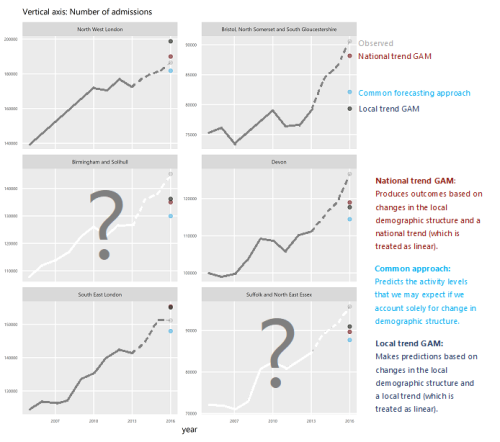 Elective care | Emergency care | Finance and payments | Policy | Primary, community and social care services
Elective care | Emergency care | Finance and payments | Policy | Primary, community and social care services
How will we know if Integrated Care Systems reduce demand for urgent care?
The implications of a blended payment system are far reaching: Decisions about planned activity levels will determine the total funding envelope for urgent care within a system and will influence the behaviour of healthcare providers and the services they deliver to patients.
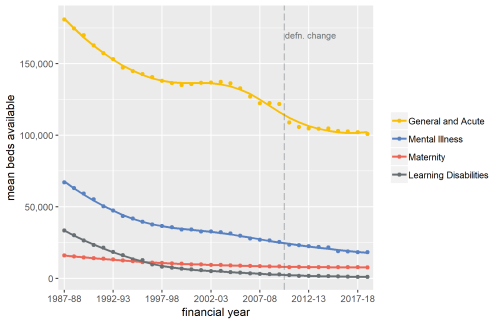 Elective care | Mental health
Elective care | Mental health
Exploring Mental Health Inpatient Capacity
This report explores the pressures on inpatient mental health services across Sustainability and Transformation Partnerships in England, drawing on a wide range of datasets, published research and interviews with staff working on mental health services. The report was commissioned by and includes…
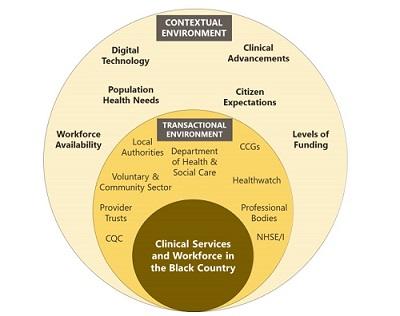 Better use of analysis | Primary, community and social care services
Better use of analysis | Primary, community and social care services
Clinical Workforce Scenarios for the Black Country
The future is highly uncertain. Unless we consider the diverse factors that could affect health, our plans will lack creativity and sustainability. The challenges facing NHS systems are headline news: NHS structures are frequently the subject of organisational change; new policy directives; funding…